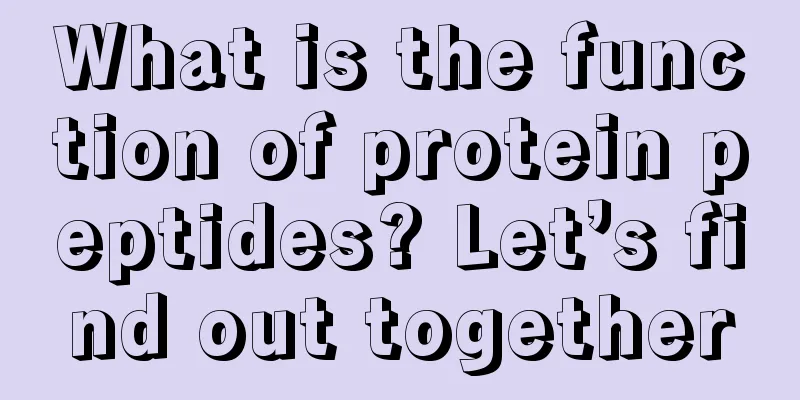What is the function of protein peptides? Let’s find out together

|
With the continuous development of society, people's work and life pressures are constantly increasing. Coupled with the induction of various bad living habits, more and more people are very lacking in protein nutrition. The main way for the human body to absorb protein is to rely on small peptides, and the absorption rate of small peptides is also relatively high. Protein peptides have multiple functions such as immune regulation, antibacterial and anti-microbial effects, and immune enhancement. Supplementing protein peptides can better replenish the various components needed in the body. Friends in need can supplement them in time. Protein peptides are indeed an indispensable part of the human body, and it is very necessary to understand its effects. 1. Introduction to protein peptides The high pressure of life, high labor intensity, long working hours and fast pace, coupled with the modern unhealthy lifestyle (smoking, drinking, playing cards, nightlife, and many sexual choices) make the human body consume twice as much energy as in the past. Therefore, even though material resources are extremely abundant, people still lack protein nutrition. The protein nutritional deficiency that experts refer to is not a lack of protein food, but a lack of small molecule protein nutrients, namely small peptides, which do not require digestion and are directly absorbed, actively absorbed, and do not burden gastrointestinal function. 2. Effects of Protein Peptides 1. Immunomodulatory function In 2013, American scientists verified the biologically active substances in shark cartilage extracts that can mediate the cytokine response of human leukocytes. When the extract and protease acted together, the ability to cause cytokine response was reduced by 80%, which shows that its active ingredient may be a protein substance. The type of active ingredient molecule was identified in the experiment, and it was proved to be a small molecule glycoprotein. According to analysis, this molecule is a type II collagen molecule derived from sharks. 2. Antibacterial effect Spanish scientists used the slice diffusion method to determine the antibacterial effect of tuna and squid collagen hydrolysates against Gram-positive bacteria, Gram-negative bacteria and fish spoilage bacteria, and found that they have antibacterial effects on certain specific bacterial groups. 3. Anti-microbial, enhance immunity Small molecule active peptides such as antimicrobial peptides, interferons, interleukins and biodefensins can activate and regulate the body's immune response, significantly increase the proliferation of human peripheral blood lymphocytes, and thus play an antimicrobial role. Other studies have shown that certain oligopeptides and polypeptides can enhance the vitality of liver cells, effectively adjust the functions of lymphocyte T cell subsets, enhance humoral immunity and cellular immunity, fundamentally improve human immunity, and are effective preparations for the treatment and prevention of various liver diseases. Protein is an important component of all cells and tissues in the human body. All important components of the body require the participation of protein. Generally speaking, protein accounts for about 18% of the total mass of the human body, and its most important thing is that it is related to life phenomena. Protein is the material basis of life, an organic macromolecule, the basic organic matter that constitutes cells, and the main bearer of life activities. There is no life without protein. In the past, scientists believed that the human body absorbs protein mainly in the form of amino acids. Recent scientific research has found that the human body absorbs protein mainly in the form of small peptides. Small peptides are more easily and quickly absorbed and utilized by the human body than amino acids. The absorption rate of small peptides in the human body is 26% higher than that of amino acids. After being absorbed by the human body, small peptides are directly used by human cells, blood and tissues. After being absorbed by the human body, amino acids must be synthesized into small peptides by the liver before they can be used by human cells and blood tissues. |
<<: How to choose meniscus knee brace?
>>: What are the symptoms of acute cerebral infarction?
Recommend
The difference between proctitis and colitis
Patients with enteritis often only know that they...
How are lymphomas treated?
The lymph nodes are the excretion system of the h...
Can I take a hot bath if I have a fever?
Many people are not very clear about whether you ...
Which one is better, liquid foundation or BB cream
Liquid foundation is a kind of cosmetic, and BB c...
What are the differences in the symptoms of advanced lung cancer? Five symptoms of advanced lung cancer patients
Many lung cancer patients have reached the late s...
How to freeze crabs
Crabs are very popular as they are rich in protei...
Insist on living a "Bajie" life in summer health preservation
As we enter the hot summer, we need to know that ...
Learn about endometrial cancer
Endometrial cancer is a malignant tumor originati...
The function of the eye mask
An eye mask is an item that is familiar to everyo...
How should prostate cancer patients be cared for after surgery?
Postoperative care for prostate cancer is crucial...
What is thyroid follicular cancer? What are the symptoms of thyroid follicular cancer?
Thyroid follicular carcinoma is a common thyroid ...
Characteristics of pain in gastric cancer
I am very happy to serve you and see your problem...
What foods are good for preventing liver cancer? Eat more strange-tasting foods to prevent liver cancer
The latest discovery is that drinking some yogurt...
Who is susceptible to solar dermatitis?
Solar dermatitis is a common disease at present. ...
What are the symptoms of recurrence of bile duct cancer
Cholangiocarcinoma is a very distressing disease....









